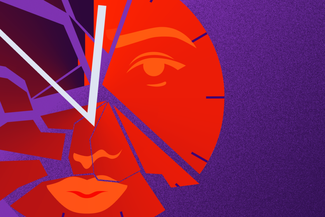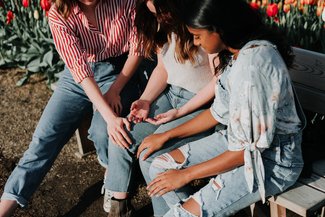
16 Days of Activism across our alliance
We share a round-up of various campaigns and launches from across our alliance this 16 Days of Activism.

13 May 2025
The Izzy Project, delivered by our member, Birth Companions, offers specialist, relationship-led support to women living or giving birth in Hackney who are at risk of, or experiencing separation from their baby shortly after birth. The service, which has been piloted since May 2024, offers a powerful example of the 1:1 advocacy support recommended for women navigating child removal in our recent briefing, ‘We Need Support’.
We spoke to Brooklynn, a member of Birth Companions’ Lived Experience Team, and Helen, Senior Coordinator on their Izzy Project, to hear more about the support they offer women navigating the removal of their newborn children.
Hi Brooklynn, hi Helen. Can you describe your roles and what you do at Birth Companions?
Brooklynn: I’m a member of Birth Companions’ (BC) Lived Experience Team. I was part of the team that co-designed the Izzy Project, and I now have an advisory role as the project develops. It’s close to my heart because I grew up in Hackney, and it’s where my own story through social care started. I know that the system is broken and needs support to change, so I was very keen to have my say on what that should look like.
Helen: I’ve been with Birth Companions for ten years, and co-ordinate two projects, including the Izzy Project. It’s been really exciting to work on this new project because my experience before Birth Companions was as a family support worker and working in a children’s home. I’m finding I’m working with women now who could have been those children, so it brings together all my experience.
Why is something like the Izzy Project needed?
B: It’s what I would have needed back when I was 18 years old and had my first child in Hackney. You’ve got childcare workers, social workers, midwives, making sure the child’s wellbeing is at the centre of everything – which is important - but always what gets forgotten about is the mother. You’re asked to pour from an empty cup, no matter what you’re bringing to your pregnancy. For me, it was addiction, domestic violence, growing up in an abusive household. By that first child, I had 18 years’ worth of trauma. You’re asking me to pour into this little baby when no-one’s poured into me.
My daughter was removed at 7 days old, I was breastfeeding. It was this huge rush to get to court, I had to leave my baby in hospital even though BC were willing to accompany me and help me have her there. Once the order had gone through they were trying to have the discharge meeting before I’d even gotten back: they wanted to remove my child without me there. That’s why the Izzy Project is so needed, because everyone’s focus becomes very critical on what the mother is doing. Once you’re discharged, it’s just like “Get to contact 3x a week.” You’re on your own. For me, domestic violence was the main cause of my children being removed, and it was like I stepped out of one DV relationship with my children’s dad and into another with the local authority and the courts. People don’t want to say this about social services but it feels like a coercive relationship: if you don’t meet their targets, regardless of the bigger picture – if you can’t get clean, or leave your relationship, those are all benchmarks used to separate you from your child, and to punish you. It was BC who helped me maintain the bond with my daughter. They’re trauma-informed, looking at what Mum needs and being able to provide support and advocacy. They help women find their voice, meet them where they’re at, and walk alongside them.
The Izzy Project was co-produced with women with lived experience of child removal. How did that process work, and why was it necessary?
B: Being a mother who needed the support and then being on the other side, I felt “I am the best people to tell professionals actually what is needed”. It’s alright going to university but if you haven’t lived it, you don’t really know. There are 5 women with lived experience involved, and then there were about 40 professionals from across Hackney who were brought in to the early stages of the design, around 10-12 of which have become a steering group who have remained involved.
Once a child is removed, a woman is just left at the wayside, so we knew we needed somewhere these women were at the centre. There was lots of research that we looked at, and conversations about what the support would look like, how we could tangibly put it in place. We looked at all the barriers women face before birth and after, and seeing where we could bridge the gap: making sure they have everything the professionals want them to have, the equipment and the rest of it. Trying to help them so they have adequate housing, and resources, money to get to all these meetings. It took quite a few meetings to hash it out and move from things looking good on paper to being put into practice, and we continue to review the design based on the challenges that the coordinators are coming up against.
What is unique about the Izzy Project?
H: We’re a charity, so we’re not bound by the same statutory remits or limitations. We can focus on each woman and what she needs as an individual. That is the fundamental basis of an Izzy Project coordinator’s work with a woman: how she’s going to talk to her and how she’s going to make that woman feel, which could potentially last a lifetime. There’s no judgement, we’re there to put our arms round them and make them feel safe and heard. I always say to women: we’re not a statutory service. We’re really clear that even though we’re someone else they’ve been referred to, they have choices. A woman doesn’t have to engage there and then, she can come back to us, and there’s no pressure if things need to change. Our only agenda is to be by their side. There’s no other support for women navigating these processes which looks like that.
What does the support look like?
H: Women often just want to talk to someone about how they got to this point and how they’re feeling about it. When it comes to navigating complex systems, like housing, family law or benefits, they can explain their needs and experiences to me so I can advocate for them or be by their side in meetings. We often seek consent to talk to, for example, a solicitor because then we can understand exactly what’s being said. But if a woman doesn’t consent that’s also fine – I don’t have to go to any meetings if she doesn’t want me to.
B: When my daughter was removed, BC helped me write a birth plan and advocate for what I wanted, in terms of having time alone, having pictures, not having anyone around me talk about removal, so I could just be in a bubble with my baby for at least that first day. I was placed right in front of the nurse’s station and not allowed to have my curtain closed, but BC helped advocate that wasn’t fair – I felt like I was being treated by a criminal, even though my child was on the register not because of me but because of my relationship.
How does the support offered by Izzy Project differ from other professionals?
B: In my case, I had GP, midwife, a social worker, police, mental health and a DV worker involved in my pregnancy before it was even viable. Then came psychiatric assessments, parenting courses – by that point I was about halfway. It’s an overload. Yet no-one in the rooms that I sat in were for me, a mum who’d had multiple children removed. The advocacy side is so important - if I had gone to a meeting and someone from the Izzy Project had been there next to me it would have felt more empowering because they’re impartial, and they’re only there to support you.
Social services knew they were going to remove my child from the start but still every visit they wanted to see I’d got equipment in the house for the baby – a cot, nappies, clothes, bathing equipment. It’s a self-fulfilling prophecy that social services put in place, because they don’t provide the means for women to jump through the hoops they put in place. Women are made to feel that they aren’t good enough, no matter what they do. The Izzy Project does the opposite of that, the approach is one of saying, ‘Ok, you’re here, but we’re going to look at the tiny steps – putting one foot in front of the other.’
Even with the domestic violence and mental health workers, they’re commissioned by social services so I knew I was going in prejudged. Someone told me that if I disclosed I was struggling with drugs, I’d get more help, but as soon as I met the perinatal mental health worker, I could see she didn’t have it in her to give. I’d had really bad experiences with court so I knew I needed to be careful with what I said. The Izzy Project can do the work in such a loving way. Women will be scared at the beginning but the possibility for trust is so much higher – that’s different from statutory services.
H: One of the biggest problems is communication with social services, and the lack of thought and care once birth has happened. There’s so little trauma-informed work around social services and how they speak and interact with women. Say a court order is put in place on a Friday, sometimes a social worker will say “We won’t remove baby over the weekend, you’ll have her until the Monday.” But then all of a sudden, they’re going to come 3 hours later. It prevents a woman from being able to be with her baby and tell her in her own way that she’s going to be saying goodbye. It’s all the planning and thought that needs to go into those moments, to try to limit the additional trauma of the actual removal. And once they’ve walked off with that baby, she’s standing on her own, unless there’s BC and family. We are fighting to try and make it work, but even with the best will in the world, it often doesn’t because professionals aren’t working in a trauma-informed way.
What are your calls to action to those in power?
H: We’ve got to remember that lots of these women have never been parented themselves. She might have been in care most of her life, she’s witnessed abuse, she’s got nowhere safe to live. See it through that person’s eyes. We’ve got to start training people to understand that trauma-informed starts with basic kindness and humanity.
B: Have empathy. Trauma is not one size fits all. Remember we are all one “wrong” decision away from being the people we work with. It just takes one thing to go wrong to end up on the flipside.
Birth Companions work on many other projects supporting mothers separated from babies, including in prisons and while on probation.
Most recently, they launched the Lost Mothers Project in collaboration with Dr Laura Abbott and researchers at the University of Hertfordshire, bringing vital focus to the needs and experiences of women who are separated from their infants due to imprisonment.

We share a round-up of various campaigns and launches from across our alliance this 16 Days of Activism.

For women with multiple unmet needs, support services are crucial to tackling disadvantage. Yet, too often, women face significant challenges trying to access this support.

Our policy, research and campaigns manager Maisie reflects on some of the detail surrounding the new Suicide Prevention Strategy, how it relates to Agenda Alliance’s previous recommendations and research on women and girl’s suicidality and mental health, and the need for a joined-up approach.